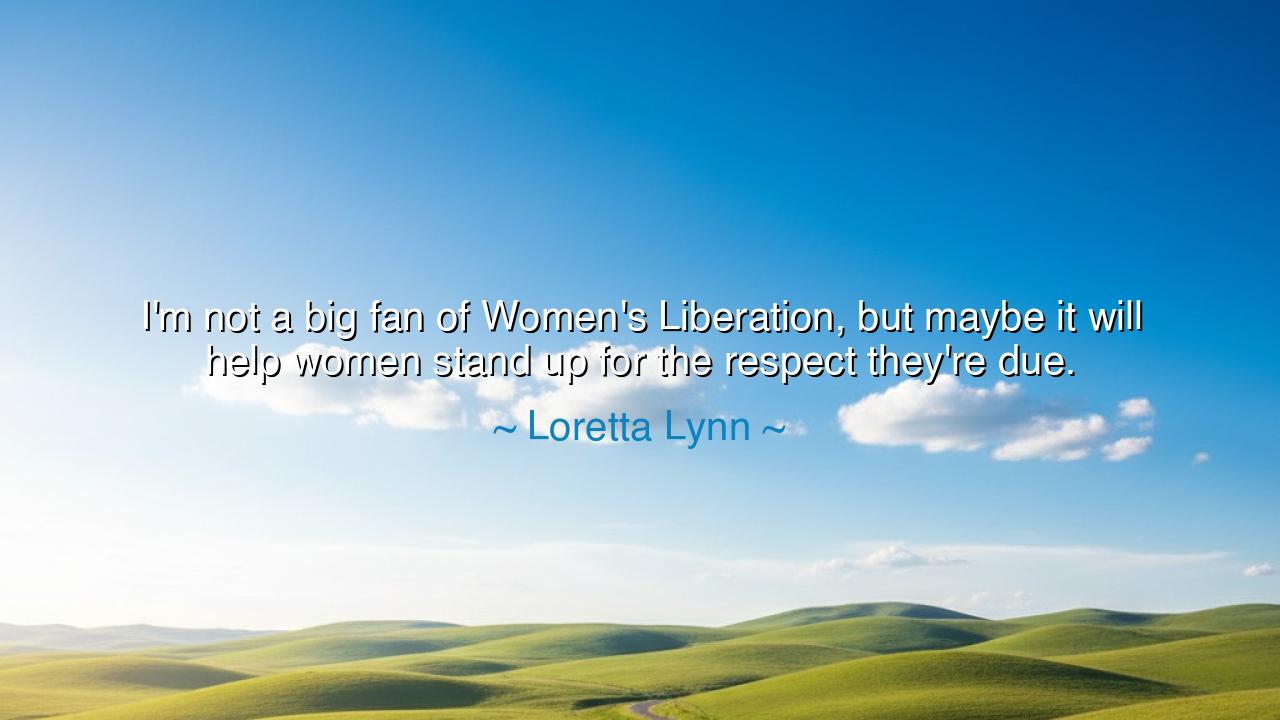
I'm not a big fan of Women's Liberation, but maybe it will help
I'm not a big fan of Women's Liberation, but maybe it will help women stand up for the respect they're due.






Hear, O listeners, the words of the coal miner’s daughter, Loretta Lynn, who declared with candor: “I’m not a big fan of Women’s Liberation, but maybe it will help women stand up for the respect they’re due.” These words, spoken not from lofty pulpits of academia but from the raw soil of lived experience, reflect the tension of her time—a woman rooted in tradition, yet unafraid to speak of change. She stood as one who carried the burdens of family, poverty, and struggle, yet she also saw the rising tide of women who demanded more than silent endurance.
The origin of this saying lies in the turbulent decades of the 1960s and 1970s, when the Women’s Liberation movement grew across America. Many women, especially in rural or working-class communities, felt caught between old expectations and new possibilities. Loretta Lynn, through her music, gave voice to these women. She sang of marriage, of hardship, of standing up to husbands who wandered or drank. Though she did not march in protests or speak in slogans, she recognized the truth in the call: that women deserved respect, and that society too often denied it.
To say she was “not a big fan” is to admit her hesitation with the radical elements of the movement. Yet her heart could not deny the deeper cause. She saw women weary from silence, from endless sacrifice, from being dismissed in their homes and their communities. She knew that any force—be it social change or music—that helped them find their voices could be a blessing. Her words remind us that one need not embrace a movement in its entirety to affirm the justice of its goals.
History is rich with echoes of this struggle. Recall Abigail Adams, who in the earliest days of the United States urged her husband John to “remember the ladies” when shaping new laws. Her warning that women would “foment a rebellion” if ignored speaks across the centuries. Or think of Sojourner Truth, who stood in the midst of abolitionist rallies and declared, “Ain’t I a woman?” She too demanded respect not as a gift but as a right. These women, like Loretta Lynn, were voices of conscience, sometimes aligned with great movements, sometimes apart from them, but always pointing toward the same truth: women are due honor and dignity.
The deeper meaning of Lynn’s words is found in her recognition that respect is the root of equality. Liberation is not merely about laws or slogans; it is about the daily regard with which one human treats another. A woman may work in the home or in the world, she may walk in tradition or in revolution, but in all paths, she must be treated with dignity. Without respect, liberation is hollow; with it, even modest lives can shine with freedom.
The lesson, O listeners, is clear: do not wait for great movements to tell you what is right. Begin in your own life. If you are a man, honor the women in your family, your workplace, your community—not with condescension, but with equality. If you are a woman, know that your worth does not depend upon permission; it is your birthright to demand the respect that is due. And if you are young, learn from those before you: social change may be contested, but the call for dignity is eternal.
Therefore, let your practice be this: speak boldly, even when you stand alone. Uphold justice, even when you hesitate about its banners. Like Loretta Lynn, you may find yourself caught between tradition and change, but never let that keep you from affirming the sacred truth: women, as much as men, are worthy of respect.
Thus let Lynn’s words endure: “Maybe it will help women stand up for the respect they’re due.” They are not merely the musings of a country singer; they are a reminder that dignity is not granted by movements alone, but by the courage of individuals who refuse to be silenced. And through such courage, generations rise freer than before.






AAdministratorAdministrator
Welcome, honored guests. Please leave a comment, we will respond soon